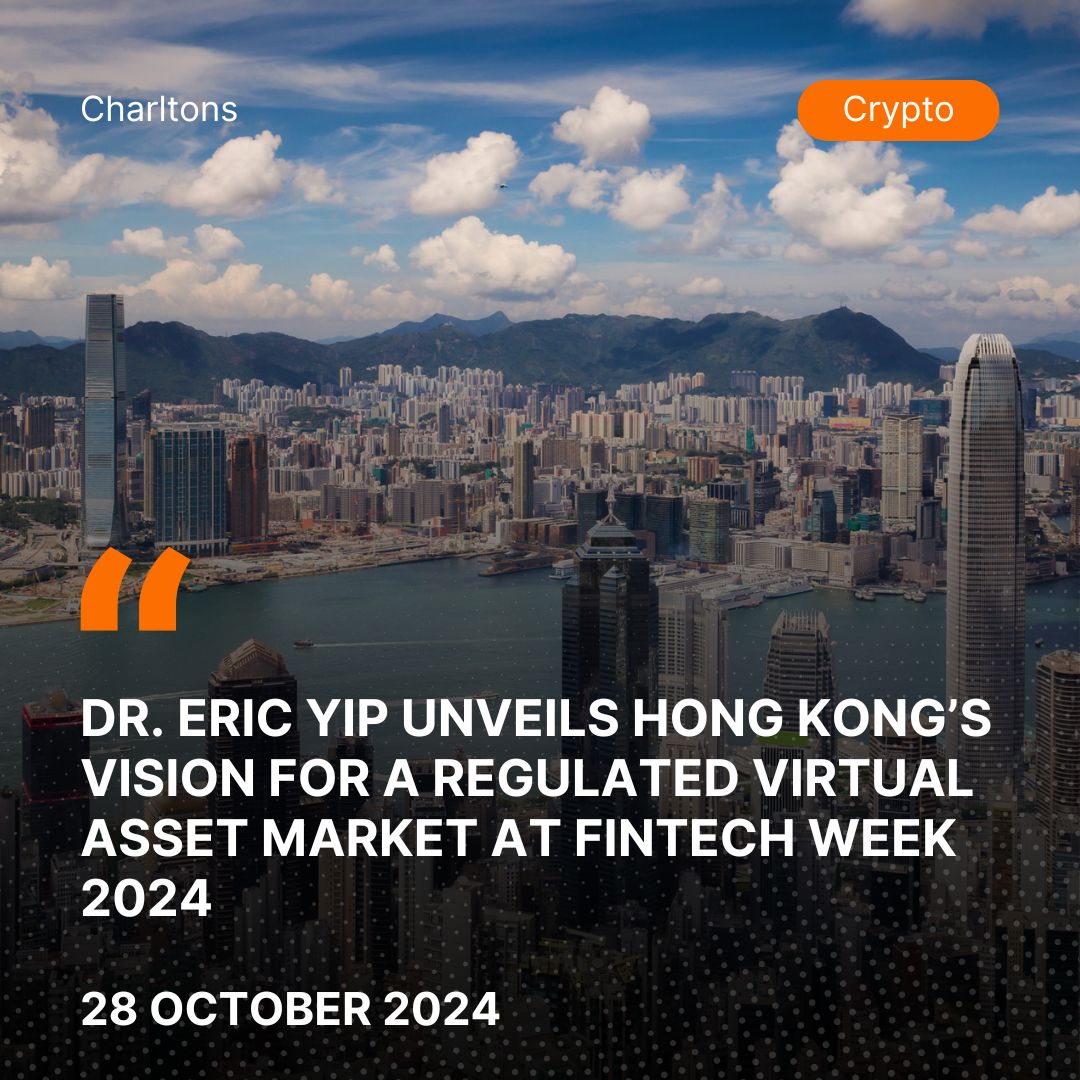
On 28 October 2024, Dr. Eric Yip, Executive Director of Intermediaries at the Securities and Futures Commission (HK SFC) in Hong Kong, in his speech addressed the Hong Kong FinTech Week audience, laying out a comprehensive roadmap for virtual asset regulation. His speech emphasized the critical balance between fostering market development and ensuring investor protection, showcasing a pragmatic approach toward integrating virtual assets into Hong Kong’s financial landscape.
In his opening remarks, Dr. Yip recognized virtual assets as a pivotal focus for financial regulators, given their significant trading volumes and the rising need to safeguard investors. He highlighted three key factors propelling the market’s growth: the influx of talent, the robust economic footprint of the industry, and a predominantly young investor demographic. Dr. Yip emphasized the need for Hong Kong to navigate a technologically advanced, borderless market often characterized by regulatory gaps and occasional volatility.
To address these challenges, Dr. Yip observed two trends that could aid in establishing a stable virtual asset market. First, the rising scrutiny from law enforcement globally has driven market participants to operate within legal boundaries. Second, the gradual convergence between traditional finance and Web3 principles has introduced essential compliance practices, such as anti-money laundering (AML) and client suitability, into the virtual asset space.
Hong Kong’s regulatory approach, grounded in the principle of “same business, same risks, same rules,” leverages established securities regulation frameworks to manage similar risks within virtual asset markets. This principle, Dr. Yip argued, forms the backbone of a resilient financial system. However, he underscored the importance of adaptability, suggesting that if regulated entities cannot sustain operations, the HK SFC must reevaluate its framework, emphasizing the importance of industry feedback.
A crucial milestone in Hong Kong’s regulatory strategy has been the swift licensing process for Virtual Asset Trading Platforms (VATPs). Since 1 June 2024, under the new licensing regime, three platforms have been fully licensed, with applications from an additional 14 currently under review. In an efficient approach, the HK SFC conducted risk-based on-site inspections to assess key compliance areas, including asset security, cybersecurity, and AML practices. Dr. Yip outlined a three-phase licensing process where applicants must complete compliance rectifications before receiving full operational approval.
To further engage the industry, the HK SFC will establish a consultative panel for all licensed VATPs in early 2025. This panel, comprising senior management from licensed entities, will facilitate collective discussions and generate a roadmap focused on investor protection and industry growth. This collaborative approach, Dr. Yip noted, would yield a comprehensive white paper outlining advancements in product offerings, compliance measures, and risk management protocols.
Looking ahead, the HK SFC aims to enhance the regulatory framework, focusing on liquidity and efficient asset custody for virtual assets. By adapting practices from traditional securities markets, the HK SFC envisions a structure that supports liquidity aggregation and orderly risk management. The commission continues to consult with the virtual asset community, examining how asset managers, brokers, and custodians can contribute to a more robust and compliant market infrastructure. Legislative efforts, aligned with the Hong Kong Government’s broader financial policy, will underpin this comprehensive regulatory framework.
Dr. Yip also shared updates on tokenization initiatives, highlighting Project Ensemble, which introduces a standardized settlement framework for tokenized assets. The project’s sandbox environment has seen successful trials, such as tokenized deposits, illustrating the potential for institutional financial innovation. Additionally, the Hong Kong Monetary Authority’s (HKMA) upcoming fiat-referenced stablecoin regime, set for 2025, is anticipated to streamline settlement processes and improve transaction certainty in the virtual asset ecosystem.
Investor protection remains a top priority, particularly given the appeal of virtual assets to a younger audience. The HK SFC has expanded its cybersecurity, cryptographic, and wallet tracing expertise, alongside proactive investor alerts and education campaigns. Efforts include a public awareness drive featuring multimedia outreach to inform investors about scams and suspicious platforms.
Dr. Yip concluded by discussing the importance of international collaboration, noting that a cohesive global regulatory approach is essential to prevent regulatory arbitrage. The HK SFC has shown its interest in partnering with global regulatory bodies, sharing insights, and maintaining Hong Kong’s position in the evolving virtual asset landscape. Dr. Yip expressed confidence that Hong Kong will continue to thrive as a global hub for virtual asset innovation and regulation.
(Source: https://www.sfc.hk/-/media/EN/files/COM/Speech/HKFTW-Speech-FINAL-EN.pdf?rev=25c208b36b0944caa4309f4738ec7820&hash=344AD2882BA4452AFF3FCFDDD79B8302, https://apps.sfc.hk/edistributionWeb/gateway/EN/news-and-announcements/news/doc?refNo=24PR180)





